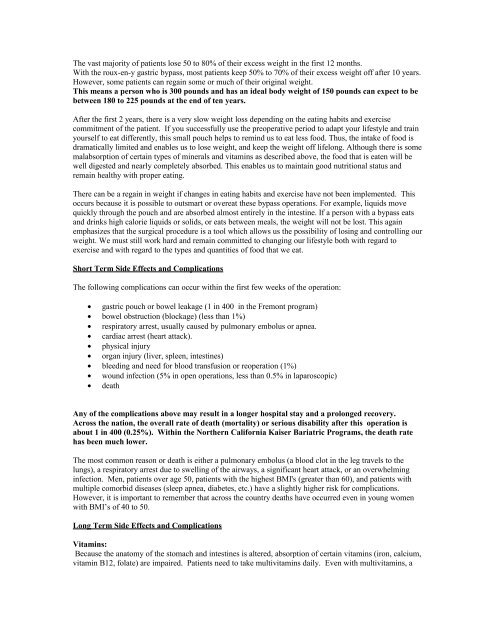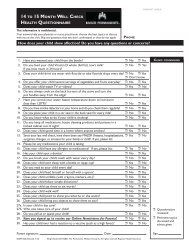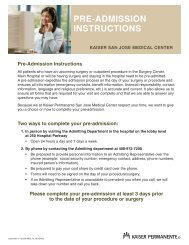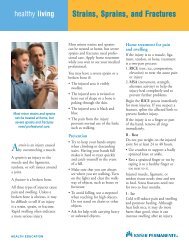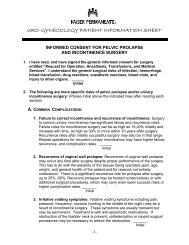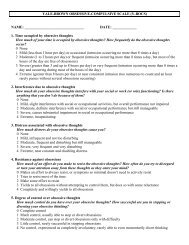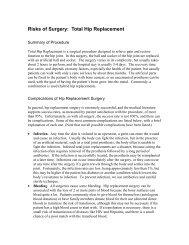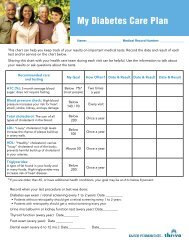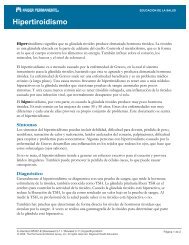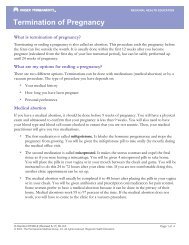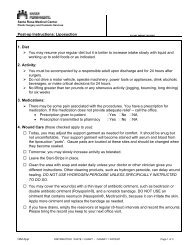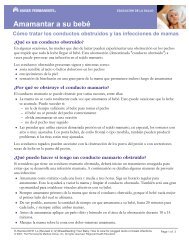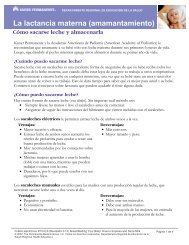Patient Information Book For Gastric Bypass Surgery - permanente.net
Patient Information Book For Gastric Bypass Surgery - permanente.net
Patient Information Book For Gastric Bypass Surgery - permanente.net
Create successful ePaper yourself
Turn your PDF publications into a flip-book with our unique Google optimized e-Paper software.
The vast majority of patients lose 50 to 80% of their excess weight in the first 12 months.<br />
With the roux-en-y gastric bypass, most patients keep 50% to 70% of their excess weight off after 10 years.<br />
However, some patients can regain some or much of their original weight.<br />
This means a person who is 300 pounds and has an ideal body weight of 150 pounds can expect to be<br />
between 180 to 225 pounds at the end of ten years.<br />
After the first 2 years, there is a very slow weight loss depending on the eating habits and exercise<br />
commitment of the patient. If you successfully use the preoperative period to adapt your lifestyle and train<br />
yourself to eat differently, this small pouch helps to remind us to eat less food. Thus, the intake of food is<br />
dramatically limited and enables us to lose weight, and keep the weight off lifelong. Although there is some<br />
malabsorption of certain types of minerals and vitamins as described above, the food that is eaten will be<br />
well digested and nearly completely absorbed. This enables us to maintain good nutritional status and<br />
remain healthy with proper eating.<br />
There can be a regain in weight if changes in eating habits and exercise have not been implemented. This<br />
occurs because it is possible to outsmart or overeat these bypass operations. <strong>For</strong> example, liquids move<br />
quickly through the pouch and are absorbed almost entirely in the intestine. If a person with a bypass eats<br />
and drinks high calorie liquids or solids, or eats between meals, the weight will not be lost. This again<br />
emphasizes that the surgical procedure is a tool which allows us the possibility of losing and controlling our<br />
weight. We must still work hard and remain committed to changing our lifestyle both with regard to<br />
exercise and with regard to the types and quantities of food that we eat.<br />
Short Term Side Effects and Complications<br />
The following complications can occur within the first few weeks of the operation:<br />
• gastric pouch or bowel leakage (1 in 400 in the Fremont program)<br />
• bowel obstruction (blockage) (less than 1%)<br />
• respiratory arrest, usually caused by pulmonary embolus or apnea.<br />
• cardiac arrest (heart attack).<br />
• physical injury<br />
• organ injury (liver, spleen, intestines)<br />
• bleeding and need for blood transfusion or reoperation (1%)<br />
• wound infection (5% in open operations, less than 0.5% in laparoscopic)<br />
• death<br />
Any of the complications above may result in a longer hospital stay and a prolonged recovery.<br />
Across the nation, the overall rate of death (mortality) or serious disability after this operation is<br />
about 1 in 400 (0.25%). Within the Northern California Kaiser Bariatric Programs, the death rate<br />
has been much lower.<br />
The most common reason or death is either a pulmonary embolus (a blood clot in the leg travels to the<br />
lungs), a respiratory arrest due to swelling of the airways, a significant heart attack, or an overwhelming<br />
infection. Men, patients over age 50, patients with the highest BMI's (greater than 60), and patients with<br />
multiple comorbid diseases (sleep apnea, diabetes, etc.) have a slightly higher risk for complications.<br />
However, it is important to remember that across the country deaths have occurred even in young women<br />
with BMI’s of 40 to 50.<br />
Long Term Side Effects and Complications<br />
Vitamins:<br />
Because the anatomy of the stomach and intestines is altered, absorption of certain vitamins (iron, calcium,<br />
vitamin B12, folate) are impaired. <strong>Patient</strong>s need to take multivitamins daily. Even with multivitamins, a


